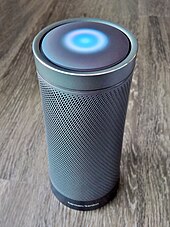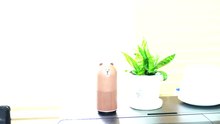Smart speaker
A smart speaker is an internet- connected speaker that transmits music wirelessly and integrates the functions of an intelligent personal assistant (IPA) via non-invasive voice control and voice recognition . In German, a uniform term for these devices has not yet been developed, which is why loan translations such as intelligent loudspeakers and networked loudspeakers are in use.
The loudspeaker function is used to play music and audio files available in the local network. Furthermore, smart speakers are used to use music streaming , news, podcast or other audio services from the Internet . Some systems also integrate smart home functions via WiFi and Bluetooth in addition to the music game function . Smart speakers have been sold in the United States since 2015 . The first devices were launched in Germany in 2016 and in Austria in 2017.
distribution
According to estimates, around 50 million smart speakers were sold worldwide by the end of 2017, and 100 million devices are expected worldwide by the end of 2018. With 200 million devices by the end of 2020, smart speakers are the fastest growing consumer technology. Sales figures are only published incompletely. With voice assistants in networked speakers, market researchers expect Apple's assistant Siri to have a 10% market share by the end of 2022, while Google and Amazon each control around a third of the market and for assistants in China and Russia, for example, they will retain around 20% market share in the future.
functionality
The devices are designed in such a way that in standby mode they first process the speech internally and wait for a signal word. The actual voice control is initiated by spoken, defined keywords or by pressing the action button. The device then digitally transmits the words spoken in the room via the Internet to the manufacturer, where an attempt is made to implement the commands. Some providers have designed their software to be open so that third-party providers can offer their services based on smartphone apps .
Application scenarios
Users of a smart speaker mainly use it to play music or listen to the radio. In a representative survey in 2019, 73 percent of users said they used their device for this. This was followed by the application scenario "controlling devices in the household" (69 percent of users did this). Other possible uses followed at a great distance: 37 percent of users called up traffic news with the smart speaker, 35 percent sports results, 32 percent bus and train departure times.
history
Voice controls began to spread in the 2010s. Smartphones were often used as end devices. Amazon was one of the first companies to develop a market-ready device that is used exclusively as a voice control device. The first Echo was available to US Prime members on November 6, 2014, generally available on June 23, 2015, and in stores outside of the US from September 28, 2016. Google followed suit and began selling its home devices in the US on November 4, 2016. In the period that followed, other competitors such as Apple, Alibaba and Samsung appeared on the market.
Data protection and privacy
The devices usually have powerful hardware that records the voice commands using several microphones. This means that audio recordings are generated even from a relatively large distance and with a higher background noise level, which can be effectively processed on the processing servers. The IPA function is only triggered by an activation password. As long as the microphone function is active, the environment is continuously monitored on the device and the last few seconds are recorded on the device. According to the manufacturer, the microphones with the mute function are hard-wired and unwanted eavesdropping is not possible. Service-related aspects can also be found on the Intelligent Personal Assistant page . The devices are usually set to an IPA, decoupled devices are not announced until 2018. There have been reports that Amazon is researching speaker- specific recognition of human voices ( speaker authentication ).
From the perspective of the German data protection officer, it is not clear to the user how and to what extent the information collected is processed. The recordings are not processed and stored in the device, but by the relevant provider.
Products
Amazon Alexa based
- Amazon Echo product family: The first devices were sold by Amazon from June 23, 2015 in the United States and from October 16, 2016 in Germany. The devices are available in different sizes and versions for different room sizes (Echo Dot, Echo Plus) with or without a graphic display (Echo Look, Echo Show). Amazon Alexa-based smart speakers had a global market share of an estimated 69.1 percent in 2017. In 2018, the global share is expected to decrease to 50.8 percent due to the increasing number of competing products. [outdated]
- Sonos One
- Hello Magenta has integrated Alexa in addition to the Magenta Assistant.
Apple Siri based
The Apple HomePod was introduced at WWDC 2017 . The HomePod was available in Australia, the UK and the US from February 2018. Sales start in Germany was on June 18th. The HomePod should achieve a global market share of 8.9 percent in 2018. [outdated]
Google Assistant-based
Based on the Google Assistant , Alphabet Inc. sold the smart speaker Google Home , which was offered in the versions Home, Max and Mini. Google Assistant-based smart speakers had a share of around 18.1 percent in the world market in 2017, and a share of 21.6 percent was expected in 2018. [outdated]
Alibaba
In 2017, the Tmall Genie of the Chinese company Alibaba Group was released with the language assistant AliGenie . In 2018, Alibaba is expected to achieve a global market share of 6.3 percent. [outdated]
Hello magenta
The German Telekom sold from September 2019 its own Smart Speaker. It was created in collaboration with the Fraunhofer Institute for Digital Media Technology and the French company Orange. [outdated]
Further products
There are also other smart speakers on the market.
- Microsoft Cortana based
- With the product "Invoke" from Harman / Kardon , Microsoft is responding to the speech recognition speakers in the products from Amazon and Google. "Invoke" is initially only available in the United States .
- Clova-based
- The South Korean company Naver Corporation sells the Smart Speakers Friends and Wave , which work with the voice assistant Clova .
- Baidu
- Baidu sells several models of smart speakers under the Baidu Raven brand .
- DingDong
- As part of a cooperation between the Chinese companies JD.com and iFlytek , the DingDong smart speaker is available in stores .
- Yandex
- The Russian internet service provider Yandex offers the smart speaker Yandex Station with the voice assistant Alice in Russia .
Announced products
- Samsung
- Samsung has announced the sale of its smart speaker based on the Bixby voice assistant for the first half of 2018. [outdated]
- Even Facebook Inc. was considering the Smart Speaker Aloha and Fiona offer, but postponed it indefinitely due to a privacy scandal.
Others
According to a study, the use of a smart speaker in the home reduces the use of smartphones.
See also
Web links
Individual evidence
- ↑ Jan Kluczniok: Comparison of smart speakers: WLAN speakers in the test. In: netzwelt.de . December 12, 2017. Retrieved December 20, 2017 .
- ↑ 'Market researchers expect 100 million smart loudspeakers' ( page no longer available , search in web archives ) Info: The link was automatically marked as defective. Please check the link according to the instructions and then remove this notice. . July 9, 2018. Retrieved July 10, 2018.
- ↑ Future of Consumer Technology - 2019. (PDF) Bitkom eV, 2019, pp. 17–19 , accessed on April 2, 2020 .
- ↑ David Katzmaier: Sonos One speaker blends Alexa, Google Assistant and Siri for $ 199. In: www.cnet.com. October 4, 2017, accessed January 15, 2018 .
- ↑ Lisa Eadicicco: Amazon Developing Advanced Voice Recognition for Alexa. In: Time.com . February 27, 2017, accessed January 29, 2018 .
- ↑ Andreas Wilkens: Vosshoff data protection officer warns of Amazon Echo. October 16, 2016, accessed January 15, 2018 .
- ↑ a b c d e Ronald Matta: Amazon Echo remains number 1, Google Home and Apple HomePod are catching up . February 16, 2018. Retrieved February 18, 2018.
- ↑ Apple is postponing HomePod smart speakers to 2018 , Macwelt, November 22, 2017
- ↑ Michaela Weidenbrück: Hello Magenta! With the smart speaker, the home listens to your word . November 13, 2017. Retrieved January 6, 2018.
- ↑ Hans-Christian Dirscherl: Telekom's smart speaker is delayed. June 8, 2018, accessed August 3, 2018 .
- ↑ Hello Magenta: Telekom Smart Speaker in Hands-On 9/9 - teltarif.de News. Retrieved August 18, 2019 .
- ↑ Hans-Christian Dirscherl: Invoke: Cortana speaker by Harmon Kardon costs 99.95 dollars. In: pcwelt.de . December 19, 2017, accessed December 30, 2017 .
- ↑ Sascha Ostermaier: Samsung: Smart Speaker should come in the first half of 2018 . December 15, 2017. Retrieved January 6, 2018.
- ↑ Lennart Gotta, Martin Malischek, Christian Just: Samsung Bixby 2.0: Better AI and attack on Alexa & Co. In: computerbild.de . October 19, 2017. Retrieved January 29, 2018 .
- ↑ Vera Bauer: Aloha and Fiona: Facebook's own smart speakers are to be presented in the summer . February 17, 2018. Retrieved February 18, 2018.
- ↑ Study: Google Home & Amazon Echo owners use their smartphones significantly less . In: Google Watch Blog. Published January 8, 2018. Retrieved January 9, 2018.





